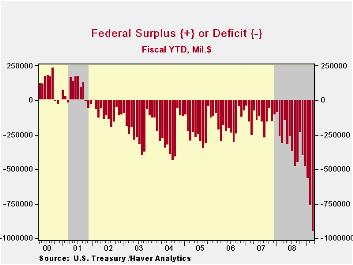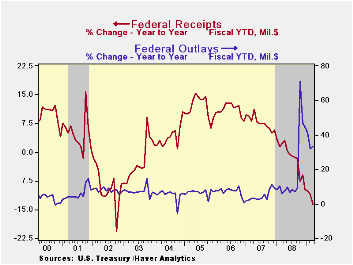 Global| Apr 13 2009
Global| Apr 13 2009U.S. Budget Deficit Broaches $1 Trillion With TARP Spending
by:Tom Moeller
|in:Economy in Brief
Summary
War in the Mideast, recession at home and TARP lifted the U.S. government's budget deficit to nearly $1 trillion during just the first half of this fiscal year. For all of FY09, the Congressional Budget Office recently estimated that [...]

War in the Mideast, recession at home and TARP lifted the U.S. government's budget deficit to nearly $1 trillion during just the first half of this fiscal year. For all of FY09, the Congressional Budget Office recently estimated that the deficit would total $1.2 trillion or 13.1% of GDP. It assumes that revenues will fall 6.6% year-to-year and that outlays will increase 19.0%.
The U.S. government ran a budget deficit of $192.3 billion
during March after a similar February shortfall. Just one year ago, the
March deficit totaled just $48.2 billion and the deficit during the
first six months of FY08 amounted to $312.8 billion, or less than
one-third this year's figure.
Net revenues during March fell by more than one-quarter versus March of last year and for the first six months of FY09 they were down 13.6% y/y. Year to date, individual income tax receipts fell 14.7% y/y as the recession took its toll and reduced aggregate hours worked. As corporate profits dried up, that lowered corporate tax receipts by more than one-half from last fiscal year. Growth in employment taxes receded to 0.6%, the least since late 2003, and unemployment insurance tax receipts fell 9.7%. Estate & gift taxes fell 10.3% after 11.3% growth last year.
Swelled by TARP, U.S. government outlays jumped by more than 33.0% from last fiscal year's first six months. Outlays under the Government's Troubled Asset Relief Program dropped off sharply during March to $2.9B but for the first six months of the program they totaled $293.4B. The U.S. Treasury adopted the view that these TARP expenditures should be counted like other government spending. In the future when banks repay the Treasury, these funds will be counted as revenue. Accounted for in this way, TARP causes a surge in the budget deficit as the funds are distributed, but leads to a smaller deficit, or perhaps a surplus, when repayments are received.
Defense spending (19% of total outlays) rose 7.7% year-to-year. Medicare expenditures (12% of outlays) increased by 11.2% but the recession swelled "income security" spending (11% of outlays) by roughly one-quarter. Social security payments rose a steady 7.3% while net interest payments continued to fall by more than one-quarter with lower interest rates.
The Government's financial data are available in Haver's USECON database, with extensive detail available in the specialized GOVFIN.
The Middle Income Tax Relief Question: Extend, Modify, or Expire from the American Enterprise Institute can be found here.
| US Government Finance | March | February | Y/Y | FY '09 YTD | FY 2008 | FY 2007 | FY 2006 |
|---|---|---|---|---|---|---|---|
| Budget Balance | -192.3B | $-192.8B | $-48.2B (3/08) |
-$957.0 | -$454.8B | -$161.5B | -$248.2B |
| Net Revenues | $129.0B | $87.3B | -27.9% | -13.6% | -1.7% | 6.7% | 11.8% |
| Net Outlays | $321.2B | $280.1B | 41.5% | 33.4% | 9.1% | 2.8% | 7.4% |
Tom Moeller
AuthorMore in Author Profile »Prior to joining Haver Analytics in 2000, Mr. Moeller worked as the Economist at Chancellor Capital Management from 1985 to 1999. There, he developed comprehensive economic forecasts and interpreted economic data for equity and fixed income portfolio managers. Also at Chancellor, Mr. Moeller worked as an equity analyst and was responsible for researching and rating companies in the economically sensitive automobile and housing industries for investment in Chancellor’s equity portfolio. Prior to joining Chancellor, Mr. Moeller was an Economist at Citibank from 1979 to 1984. He also analyzed pricing behavior in the metals industry for the Council on Wage and Price Stability in Washington, D.C. In 1999, Mr. Moeller received the award for most accurate forecast from the Forecasters' Club of New York. From 1990 to 1992 he was President of the New York Association for Business Economists. Mr. Moeller earned an M.B.A. in Finance from Fordham University, where he graduated in 1987. He holds a Bachelor of Arts in Economics from George Washington University.
More Economy in Brief
 Global| Feb 05 2026
Global| Feb 05 2026Charts of the Week: Balanced Policy, Resilient Data and AI Narratives
by:Andrew Cates






